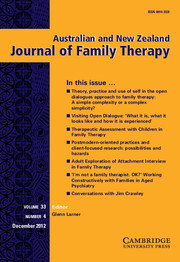Crossref Citations
This article has been cited by the following publications. This list is generated based on data provided by Crossref.
Fantini, Francesca
Aschieri, Filippo
and
Bertrando, Paolo
2013.
“Is Our Daughter Crazy or Bad?”: A Case Study of Therapeutic Assessment with Children.
Contemporary Family Therapy,
Vol. 35,
Issue. 4,
p.
731.
Chudzik, L.
and
Aschieri, F.
2013.
Clinical relationships with forensic clients: A three-dimensional model.
Aggression and Violent Behavior,
Vol. 18,
Issue. 6,
p.
722.
Frackowiak, M.
Fantini, F.
and
Aschieri, F.
2015.
L’évaluation thérapeutique : description de quatre modèles.
Pratiques Psychologiques,
Vol. 21,
Issue. 4,
p.
319.
Aschieri, F.
de Saeger, H.
and
Durosini, I.
2015.
L’évaluation thérapeutique et collaborative : preuves empiriques.
Pratiques Psychologiques,
Vol. 21,
Issue. 4,
p.
307.
Krishnamurthy, Radhika
Finn, Stephen E.
and
Aschieri, Filippo
2016.
The Wiley Handbook of Personality Assessment.
p.
228.
Fantini, Francesca
Aschieri, Filippo
and
Finn, Stephen E.
2022.
Comprehensive Clinical Psychology.
p.
321.
Asai, Konomi
and
Asai, Keigo
2023.
Therapeutic Assessment with Brief Therapy:.
International Journal of Brief Therapy and Family Science,
Vol. 13,
Issue. 1,
p.
43.
Aschieri, Filippo
Cera, Giulia
Fiorelli, Elisabetta
and
Brasili, Sara
2024.
A retrospective study exploring parents’ perceptions of their child’s assessment.
Frontiers in Psychology,
Vol. 14,
Issue. ,
Cassera, Luisa
Calabrò, Alessia
and
Filippo, Aschieri
2024.
Positive events in psychotherapy: What do adolescents and young adults say is helpful?.
F1000Research,
Vol. 13,
Issue. ,
p.
1025.
Mellado, Augusto
del Río, María Teresa
Andreucci-Annunziata, Paola
and
Molina, María Elisa
2024.
Psychotherapy focusing on dialogical and narrative perspectives: a systematic review from qualitative and mixed-methods studies.
Frontiers in Psychology,
Vol. 15,
Issue. ,


